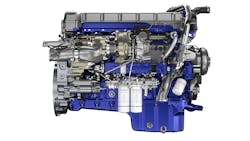Volvo Trucks’ D13 Turbo compound engine now standard on all VNL models
The enhanced D13 Turbo Compound (D13TC) engine from Volvo Trucks is now standard on all Volvo VNL models, providing enhanced fuel efficiency and reducing overall cost of ownership.
According to Volvo, the D13TC engine is designed to minimize greenhouse gas emissions while enhancing fuel economy. Customer orders have increased in North America following the select release of the D13TC engine in 2020, lessening the compromise between fuel efficiency and productivity.
In the Volvo VNL 740, 760 and 860 models, the new D13TC engine works to offer more fuel savings for a wider range of applications, such as long haul or local delivery, as well as fully or partially loaded. According to the company, the D13TC engine delivers improved fuel efficiency of up to 11% compared to 2015 Volvo truck models. Enhanced fuel efficiency options from Volvo Trucks like the Xceed package, available on the VNL 760 and 860, can include the FlowBelow Aerokit and other optimized exterior design features to deliver fuel efficiency gains as high as 16%.
“By making the D13TC engine standard in our VNL product lineup, we’re taking fuel economy and optimized performance to the next level,” said Johan Agebrand, director of product marketing at Volvo Trucks North America. “Environmental care is one of Volvo Trucks’ core values, so we’re proud of the success we’re having to reduce the carbon dioxide footprint for fleet operators while lowering their operating costs.”
Fleet tested performance
Since the introduction of the first-generation D13TC engine in North America in 2017, fleet customers like Tom MacDonald Trucking, VTS Transportation, and Tyson Foods have seen improved efficiencies. In fact, based on real-world fuel consumption testing performed by Volvo Trucks, fuel efficiency has increased more than the 3% originally projected. These companies and others, after the success delivered by the first-generation D13TC engine, have ordered the latest enhanced version, trusting that it will produce even greater fuel efficiency improvements.
VTS, based in suburban Sacramento, California, reports significant fuel savings for its fleet of 11 Volvo D13TC-powered VNL 760s, while Tom MacDonald Trucking cites outstanding improvements to its average miles per gallon and fuel costs. Additionally, Tyson Foods made the D13TC-powered Volvo VNL 740 the preferred tractor in its nationwide fleet.
Depending on the operation, the next-generation D13TC engine provides fuel savings up to 6% compared to the 2020 Volvo D13 VGT engine. The new Turbo Compound engine improves emissions, reducing the overall carbon dioxide footprint while still maintaining high average transport speeds. Sustained transport speeds and improved reliability result in more efficient operations and increased revenue, while further boosting driver retention.
The new D13TC engine also provides optimized performance efficiency for a wide range of applications, including tanker, bulk haul and flatbed. Dynamic Torque, a feature standard on the D13TC engine, enables the vehicle to adjust to the exact load without impacting performance. Fleet operators benefit from the system’s versatility and the reduced impact of fuel price fluctuations, while drivers appreciate the responsiveness and uphill power.
“The engineering advancements built into the new D13TC engine reflect Volvo Trucks’ commitment to leadership in sustainable transport solutions,” added Agebrand. “Customers trust our brand to not only prioritize energy conservation and reduced emissions, but also provide a power source that does not compromise on performance.”
